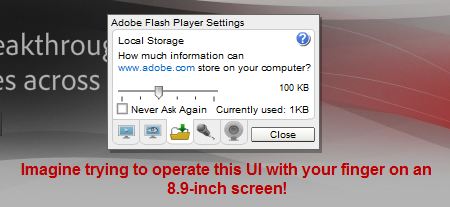Microsoft already has the ideal tablet OS, and it's not called Windows 7

As the year draws to a close it's time to start speculating as to what 2011 will bring. One item that's bound to dominate discussions are tablet PCs and whether Microsoft can make Windows work on this emerging platform.
2010 has proved to use several things about the tablet market that we didn't know in 2009. First, Apple have proved to everyone that there's a market for tablet systems. A huge market, and one that's not confined to the enterprise market. It seems that ordinary people want tablets, and are willing to pay $500 for them.
We also found out that people are happy to accept a tablets running non-desktop operating systems. Apple put a different flavor of the iOS platform to the one on the iPhone, and we've also seen tablets running the Android OS.
But we're still left with a big question - can Microsoft make the Windows OS work on tablets?
OK, before we go any further, allow me to point out that Windows-based tablets do indeed exist. Take the HP Slate 500 for example. This device features an Intel Atom Z540 processor and comes with 2GB of RAM and 64GB of flash-based storage, all of which is topped off with an 8.9-inch multi-touch display. It runs Windows 7. How well does it run Windows 7? Well, it runs as well as you'd expect a system based on an Atom processor to run Windows. If pressed for a single word to describe the experience, I'd choose "mediocre."
Note: No, you can't play Crysis on the Slate 500 ... or Angry Birds!
But the problem isn't just down to speed and power, it's the screen. Or more precisely, the size of your finger compared to the size of screen elements such as icons, buttons, drop-down boxes and so on. The Windows user interface has been designed to be operated by a cursor, not a fingertip. HP seem to acknowledge this weakness with the Windows platform because the Slate 500 comes with a digital pen. But that pen adds a whole new level of hassle, not to mention vital (and expensive to replace) parts to lose.
Put that another way, Windows 7 on a tablet is kludgy, and requires the addition of a digital pen, which makes the whole thing kludgier.
So can Microsoft make Windows work on the small screen? I don't know. When I look at Windows 7 I see an OS designed primarily with the desktop in mind, and notebooks secondary. Over the years we've seen inches added to the dimensions of the displays we sit in front of, and even quite reasonably priced notebooks come with some pretty big displays. Windows makes pretty good use of this extra screen real estate. What I don't see in Windows 7 is much (any?) consideration given to making Windows better suited to small screens and small screen use. Even touch support in Windows is pretty basic, and the core OS offers no support for tablet features such as screen orientation, and movement detection via the use of accelerometers and gyroscopes. Core support for this sort of stuff isn't absolutely necessary, but without it users have to rely on third-party drivers, which can get messy.
I can see Windows getting some sort of new skin or theme to make it better suited to tablets, but that doesn't solve the problems caused by the user interface of installed applications or interfaces generated by middleware such as Adobe Flash.

Sidenote: Even netbooks present a problem when it comes to screen size when using some applications. Trying to get an application like Outlook to fit on a small screen and still be usable is a major pain.
When you consider the issues faced by the idea of scaling down a desktop OS to fit onto a tablet, and then thrown in all the usability curveballs, quirks and nightmares potentially associated with every single application that is designed for the desktop, you quickly realize that using an OS designed for a small screen, like a smartphone, makes a lot more sense. Sure, you're kicking off a new ecosystem, and it means that you're not getting the desktop experience on a tablet, but when the desktop experience on a tablet sucks as much as it does, that might not be such a bad thing.
Windows 7 doesn't work on tablets, not because it's an inferior operating system, but because it's designed for an entirely different ecosystem.
Here's a prediction of mine for 2011. Microsoft is sitting on an OS that would be ideal for tablets. It's not called Windows 7, it's called Windows Phone 7. But because Microsoft is so late getting its mojo together in the mobile arena, and it's still very early days for Windows Phone 7, the Redmond giant can't start sticking this new OS on tablets because people don't really trust Windows Phone 7 yet, consumers and developers alike. Sticking Windows Phone 7 on tablets at this point in time would be suicide for both Microsoft and the OEMs, and would rush the entire Windows-powered tablet market into a coffin. I have to assume that Microsoft is smart since a whole bunch of smart people worth there, and if they're smart, they already recognize the fact that Windows doesn't work on tablets. Windows Phone 7 is the ideal platform to develop into a tablet OS. It's designed for small touchscreens, it offers support for tablet features such as screen orientation and motion, and most importantly, the apps are designed for small touchscreens.
My guess is, if things go well with Windows Phone 7 based smartphones, we'll see Windows Phone 7 tablets before the end of 2011.